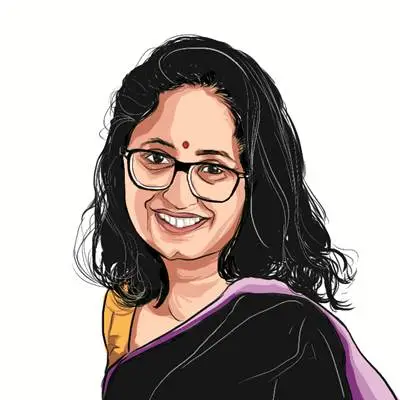Opinion Mammootty and ‘Kaathal’: Taking on the miseries of the Great Indian Marriage
The film is brave because a mainstream superstar plays an openly queer character and it has the courage — without caricatures or villains — to explore the oppressions of matrimony
 Mammootty in a still from Kaathal (2023), directed by Jeo Baby. (Video screengrab/ YouTube)
Mammootty in a still from Kaathal (2023), directed by Jeo Baby. (Video screengrab/ YouTube) Happiness, in Jeo Baby’s new film Kaathal — The Core, comes quietly, padding in on tip-toe, respecting the fact that its middle-aged protagonists, having been estranged from the notion for so long, may not immediately recognise it. Like in The Great Indian Kitchen, Baby’s searing 2021 drama, Kaathal, which stars Mammootty and Jyothika as the unhappy couple, is about a bid for freedom from the prison that marriage can become. For the young woman played by Nimisha Sajayan in TGIK (all the characters remained unnamed in the film), the struggle was to be liberated from the idea that once married, a woman ceases to be an individual with desires and dreams of her own, transforming into a repository of other people’s expectations — of a clean house, hot meals and a warm bed. For Matthew and Omana in Kaathal, the freedom is from a lie that they have been forced to inhabit for 20 years: They’ve never been “happily married” because Matthew is gay and in a long-term monogamous relationship with another man.
Since its release, the words “brave” and “courageous” have been the most used in discussions about Kaathal. One reason for this is immediately obvious: This may be the first time that an Indian megastar — which is what Mammootty has been for nearly three decades now — has played a queer character. Over the course of his career, spanning just over half a century, the 72-year-old’s range of roles has arguably been wider than that of any other Indian actor of similar stature. He’s played a larger-than-life, “massy” hero many times, but he has also taken chances with characters that are weak, troubled, flawed and often just despicable (such as in the 1994 Adoor Gopalakrishnan film Vidheyan, for playing whose tyrannical villain he won his second National Award). As a romantic hero, he’s struck every note possible, from the dashing and sexy to the forlorn and wistful (as seen in another memorable turn in an Adoor film, 1990’s Mathilukal, where he played the novelist Basheer, imprisoned and in love with a woman he can only hear on the other side of a wall).
At a time when stories about LGBTQI+ loves and lives are becoming part of the mainstream, perhaps it was only natural that he would be the first from the uppermost tier of Indian stardom to play a queer character (one can’t help but recall the backhanded compliment for Mammootty’s range in a scene from the 2016 film Maheshinte Prathikaram, in which a character played by Soubin Shahir professes his preference for the other great Malayalam star Mohanlal because, he only plays “top-class Vermas, Nairs and Menons”, unlike “Mammukka” who will take on anything from the role of a teaseller to that of a “retard”).
But Kaathal is also brave for another reason — it takes on the holiest of cows — the Great Indian Marriage — and, with great compassion and sans any attempt at villainising anyone, looks at what turns it into such an oppressive institution. No nagging saas, no conniving “other” woman or man and no dramatic denouements here — just the ordinary heartbreak of incompatibility and misguided parental intentions, tenderly explored. TGIK was an angrier, more powerful film, but Baby’s new one is the more moving of what seems to be his ongoing examination of Indian marriage. In Kaathal, marriage is a trap and a mirage for everyone — from the father who believes that he can “straighten” out his son by pressuring him into a “normal” marital life, to the woman who loses her prime years to a non-functioning marriage (a very moving performance by Jyothika), to the man whose fear of living his truth has made him shrink into himself (a brilliant, fully embodied performance by Mammootty — a physically imposing man in real life — shows how much smaller a man living half a life can seem).
Also brave is how the film ends, gesturing towards a horizon of hope and fulfilment. Of course, there are other Indian films about queer people that have steered clear of easy narratives of victimhood and torture porn. Notably, the 2022 Hindi film Badhaai Do, about a lavender marriage, presented the possibility of a fairytale ending, where boy meets boy and girl meets girl and they all live happily ever after. Kaathal doesn’t end on quite such an upbeat note, the timidity of its steps towards the inevitable (but is it inevitable, the film seems to ask) seeming far more true to life.
At the end of the film, a 40-something Omana, who has been so firm and centred during the divorce, becomes anxious when embarking on a fresh romantic quest. Matthew finally stands up to his full height, but his gestures and gaze retain the hesitancy that has marked his actions for so much of his life — as does the smile of his partner Thankan. The fight for happiness, after all, is often far more bruising for the spirit than most of our films are willing to acknowledge.
pooja.pillai@expressindia.com






